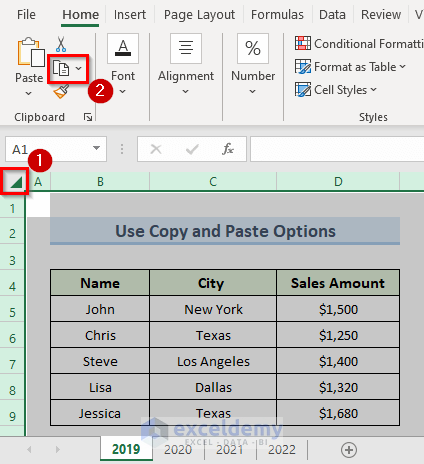5 Simple Ways to Split an Excel Sheet

Working with Excel can be a challenge when you need to manage large datasets, especially when the volume of data grows too unwieldy for efficient analysis or presentation. Splitting an Excel sheet into more manageable segments can enhance performance, readability, and workflow efficiency. Here are five simple methods to split an Excel worksheet:
1. Using the “Move or Copy” Feature

Excel’s built-in “Move or Copy” sheet function allows you to create duplicates of sheets or to reorganize your workbook. Here’s how to use it:
- Right-click on the sheet tab you wish to split.
- Select Move or Copy...
- In the dialog box, choose the destination workbook from the dropdown menu or keep it in the current workbook.
- Select a new name for the sheet if needed.
- Check "Create a copy" if you want to keep the original.
⚠️ Note: This method does not split the content but copies the entire sheet. If you need to divide content, you'll have to manually move data or use the following methods.
2. Filtering and Copying Data

Another way to split your Excel data is by using filters:
- Select your data range.
- Go to Data > Filter.
- Apply filters to narrow down the data you want to keep in one sheet.
- Copy and paste the filtered data into a new sheet.
3. Creating Tables

Excel tables can provide an organized way to manage and split data:
- Convert your range into a table by selecting your data and using Insert > Table.
- Use table filters to select specific data, then copy it into a new table or sheet.
4. Advanced Filters

For more complex data splitting, use Excel’s Advanced Filter:
- Select your data range.
- Go to Data > Advanced in the 'Sort & Filter' group.
- Choose to filter in place or copy to another location.
- Set up your criteria range or use formulas for more dynamic filtering.
📝 Note: This method allows for more granular control over what data gets copied, especially useful for large datasets with complex criteria.
5. VBA Macros

If you need to automate or repeatedly split sheets, VBA can be invaluable:
- Open the VBA editor (Alt + F11).
- Insert a new module and write or copy a macro to automate sheet splitting.
| Method | Description | Use Case |
| Move or Copy | Copy or move entire sheets. | Reorganizing data or keeping backups. |
| Filtering | Use filters to select and copy data to new sheets. | Simple data segmentation based on visible filters. |
| Excel Tables | Manage and filter data in table format. | For structured, recurring data splits. |
| Advanced Filters | Filter data with complex criteria. | When regular filtering is insufficient. |
| VBA Macros | Automate the process of splitting data. | Recurring or complex splitting tasks. |

To wrap up, splitting an Excel sheet into smaller, more manageable segments can significantly improve productivity and data analysis capabilities. Whether you're dealing with large datasets or need to organize data for reporting or further analysis, these methods offer you flexibility and efficiency. By choosing the method that best suits your needs, you can streamline your workflow and ensure your data remains both accessible and analyzable.
Can I split a sheet based on column values?

+
Yes, using Advanced Filters or VBA, you can split data based on specific column values or criteria.
Will splitting an Excel sheet affect formulas?

+
If not done carefully, formulas might break. Ensure references are updated when moving data to new sheets.
How do I ensure data integrity when splitting sheets?

+
Always verify the data before and after splitting, and use methods like ‘Create a copy’ to maintain the original data’s integrity.



